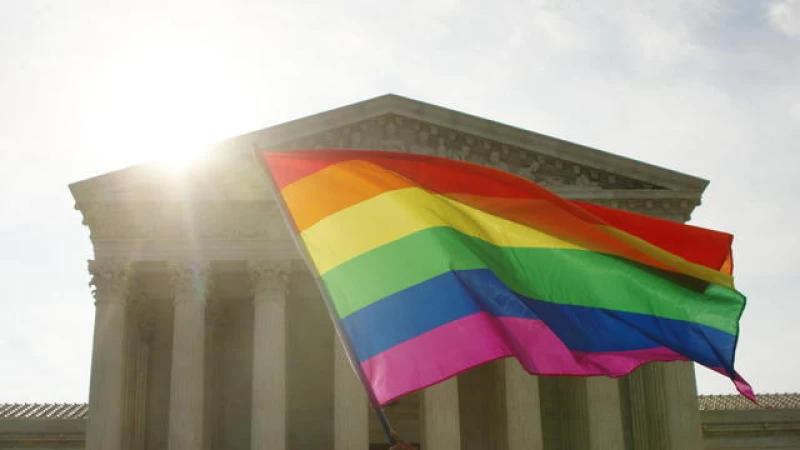Recently, a Catholic school in North Carolina found itself in the spotlight for its decision to terminate a gay teacher who had shared news of his marriage on social media ten years ago. The school's actions were upheld by a federal appeals court, which overturned a previous ruling by a judge.
The 4th U.S. Circuit Court of Appeals in Richmond, Virginia, made the decision to reverse a 2021 ruling that had found Charlotte Catholic High School and the Roman Catholic Diocese of Charlotte guilty of violating Lonnie Billard's federal employment protections against sex discrimination under Title VII of the Civil Rights Act. According to a court document, the school cited Billard's "advocacy in favor of a position that is opposed to what the church teaches about marriage" as the reason for not inviting him back as a substitute teacher.
U.S. District Judge Max Cogburn had previously determined that Billard, who had worked as a full-time teacher for a decade until 2012, was considered a lay employee for the specific purpose of teaching secular classes. Cogburn stated that a trial would be necessary to decide on appropriate relief for Billard. It is worth noting that a 2020 ruling by the U.S. Supreme Court extended Title VII protections to workers who were terminated based on their sexual orientation or gender identity.
Ruling Upheld in Case of Teacher Fired by Charlotte Catholic High School
In a recent decision, Circuit Judge Pamela Harris upheld the ruling that teacher Peter Billard fell under a "ministerial exception" to Title VII. This exception, derived from the First Amendment, protects religious institutions in how they treat employees who play a central role in their religious missions, even if their tasks may not overtly advertise their religious nature.
Billard, who primarily taught English and drama as a substitute at Charlotte Catholic High School, was expected to integrate faith throughout the curriculum. The school's requirement for instructors to be prepared to teach religion as needed was a key factor in determining Billard's role in the school's religious mission.
According to Harris, "The record shows that (Charlotte Catholic) deemed it 'vital' to its religious mission for teachers to bring a Catholic perspective to both Shakespeare and the Bible. Our court has previously acknowledged that seemingly secular tasks like teaching English and drama can be so intertwined with religious significance that they fall under the ministerial exception."
Billard, who filed a lawsuit against the school in 2017, had been working at Charlotte Catholic since 2001. In 2014, after same-sex marriage was legalized in North Carolina, Billard announced his decision to marry his now-husband.
In a press statement, there was disappointment expressed by the American Civil Liberties Union and a Charlotte law firm regarding the recent reversal of a decision that affected a gay teacher in North Carolina. The statement referred to it as "a heartbreaking ruling for our client who simply wanted the freedom to fulfill his role as an educator without concealing his true self or who he loves."
On the other hand, an attorney representing a group supporting the Charlotte diocese viewed the decision as a triumph, stating that it is "a win for individuals of all religions who value the liberty to impart their faith to the next generation." The diocese oversees 20 schools in western North Carolina.
"The Supreme Court has made it unequivocally clear: Catholic schools have the autonomy to select teachers who are fully aligned with Catholic doctrine," mentioned Luke Goodrich from The Becket Fund for Religious Liberty. The case received briefs from attorneys general in nearly 20 left-leaning states, as well as legal representatives from Christian denominations, schools, and various other organizations.
In a recent court ruling, Circuit Judge Paul Niemeyer, an appointee of former President George H.W. Bush, sided with the opinion put forward by Harris. Meanwhile, Circuit Judge Robert King, a nominee of former President Bill Clinton, expressed his agreement with the decision to reverse the case. However, King also raised concerns about the application of the ministerial exemption. He argued that Charlotte Catholic should have been covered under a different exemption in Title VII, which applies to religious education institutions and allows for the dismissal of an employee.
Lonnie Billard, the individual at the center of the case, expressed his disappointment with the court's ruling in an interview with CNN. He stated, "There's lots and lots of case law that backs me up. But my biggest feeling is confusion. I just felt you can't tell people who you can love and who you can marry. That's not right, you can't, you shouldn't be able to fire somebody because they love someone else. And that's why I went through what I did."







